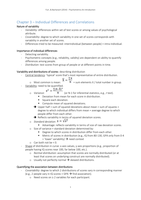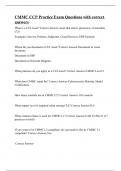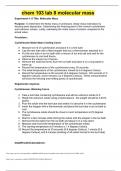Furr, & Bacharach (2014) – Psychometrics An introduction
Chapter 3 – Individual Differences and Correlations
Nature of variability
- Variability: differences within set of test scores or among values of psychological
attribute.
- Covariability: degree to which variability in one set of scores corresponds with
variability in another set of scores.
- Differences tried to be measured: interindividual (between people) + intra-individual.
Importance of individual differences
- Detecting variability.
- Psychometric concepts (e.g., reliability, validity) are dependent on ability to quantify
differences among people.
- Distribution: test scores from group of people or at different points in time.
Variability and distributions of scores: describing distribution
- Central tendency: ‘typical’ score that’s most representative of entire distribution.
o Most common is mean: = sum elements X / total number in group.
- Variability: need to be quantified.
o Variance: (or N-1 for inferential statistics, e.g., t test).
Deviation from mean for each score in distribution.
Square each deviation.
Compute mean of squared deviations.
Upper half = sum of squared deviations about mean = sum of squares =
degree to which individual differs from mean = average degree to which
people differ from each other.
Reflects variability in terms of squared deviation scores.
o Standard deviation:
Advantage: reflects variability in terms of size of raw deviation scores.
o Size of variance + standard deviation determined by:
Degree to which scores in distribution differ from each other.
Metric of scores in distribution (e.g., IQ from 80-130, GPA only from 0-4
= ‘lower’ variability) need context
o Can both not be < 0.
- Shape of distribution in curve: x-axis values, y-axis proportions (e.g., proportion of
people having IQ scores near 100, far below 100, etc.).
o Normal distribution: assumption that scores are normally distributed (or at
least that scores on underlying construct are normally distributed).
o Usually not perfectly normal skewed distributions.
Quantifying the association between distributions
- Covariability: degree to which 2 distributions of scores vary in corresponding manner
(e.g., 2 people vary in IQ scores + GPA find association).
o Need scores on ≥ 2 variables for each participant.
1
Chapter 3 – Individual Differences and Correlations
Nature of variability
- Variability: differences within set of test scores or among values of psychological
attribute.
- Covariability: degree to which variability in one set of scores corresponds with
variability in another set of scores.
- Differences tried to be measured: interindividual (between people) + intra-individual.
Importance of individual differences
- Detecting variability.
- Psychometric concepts (e.g., reliability, validity) are dependent on ability to quantify
differences among people.
- Distribution: test scores from group of people or at different points in time.
Variability and distributions of scores: describing distribution
- Central tendency: ‘typical’ score that’s most representative of entire distribution.
o Most common is mean: = sum elements X / total number in group.
- Variability: need to be quantified.
o Variance: (or N-1 for inferential statistics, e.g., t test).
Deviation from mean for each score in distribution.
Square each deviation.
Compute mean of squared deviations.
Upper half = sum of squared deviations about mean = sum of squares =
degree to which individual differs from mean = average degree to which
people differ from each other.
Reflects variability in terms of squared deviation scores.
o Standard deviation:
Advantage: reflects variability in terms of size of raw deviation scores.
o Size of variance + standard deviation determined by:
Degree to which scores in distribution differ from each other.
Metric of scores in distribution (e.g., IQ from 80-130, GPA only from 0-4
= ‘lower’ variability) need context
o Can both not be < 0.
- Shape of distribution in curve: x-axis values, y-axis proportions (e.g., proportion of
people having IQ scores near 100, far below 100, etc.).
o Normal distribution: assumption that scores are normally distributed (or at
least that scores on underlying construct are normally distributed).
o Usually not perfectly normal skewed distributions.
Quantifying the association between distributions
- Covariability: degree to which 2 distributions of scores vary in corresponding manner
(e.g., 2 people vary in IQ scores + GPA find association).
o Need scores on ≥ 2 variables for each participant.
1






